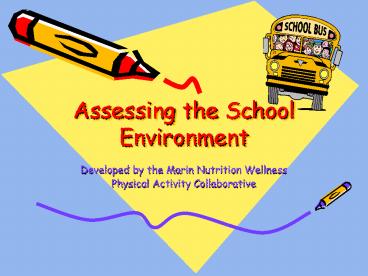Assessing the School Environment - PowerPoint PPT Presentation
1 / 16
Title:
Assessing the School Environment
Description:
Elementary School. Middle School/High School. SHI Format. Self-Assessment: ... Worksheets lead to development of a 'Plan for Action' for improvements ... – PowerPoint PPT presentation
Number of Views:29
Avg rating:3.0/5.0
Title: Assessing the School Environment
1
Assessing the School Environment
- Developed by the Marin Nutrition Wellness
- Physical Activity Collaborative
2
Step 3 of Roadmap
- School Health Council meets to
- gather/review their existing district health
policies - assesses the school environment
- summarize results
3
Why make the effort?Reasons to do a formal
assessment
- Gives structure so you know what you are looking
for and can determine who is doing what - Identify strengths and promote them
- Identify weaknesses to improve them
- To provide objective data to the School Board
- To justify recommended policy
- Provide rationale for funding
- To identify your core resources to build on
- To share resources to avoid duplication
- or re-inventing the wheel
- Stimulate new ideas about student wellness
- Makes the next steps a lot easier
4
For Support dataon the education and health
status of youth in your state
- The CDC's data on obesity trends
- http//www.cdc.gov/nccdphp/dnpa/obesity/trend/
- The CDC's Youth Risk
- Surveillance System http//www.cdc.gov/HealthyYo
uth/yrbs/index.htm - Action for Healthy Kids'
- State Profiles for Action http//www.actionforhea
lthykids.org/state.php
5
Assessment Tools
- USDA Team Nutrition Changing the Scene, a
tool kit designed to address improvements in the
school nutrition environment. The State of
Michigan modified this improvement checklist (a
link is available from this website) to help you
measure progress as you take action. - http//www.fns.usda.gov/tn/Resources/changing.htm
l - Centers for Disease Control/Healthy Youth
School Health Index, a self-assessment and
planning guide that enables schools to identify
strengths and weaknesses of their health policies
and programs, develop action plans for improving
student health, and involve teachers, parents,
students, and the community in improving school
policies, programs, and services. This
assessment tool is now available to schools
online and includes online tools for summarizing
results. - (Recommended by the Collaborative)
- http//apps.nccd.cdc.gov/shi/
6
School Health Index
7
SHI Format
- ? No Cost
- ? Completed by school health teams
- Meets Section 204 requirement
- Members should represent each school in district
- Involving youth in the process is highly
desirable - ? Two separate versions
- Elementary School
- Middle School/High School
8
SHI Format
- ? Self-Assessment
- Consists of 8 modules which follow the
Coordinated School Health Program model - 4 of 8 relate to Local School Wellness Policy
- ? Worksheets lead to development of a Plan for
Action for improvements - ? Well tested and frequently used
9
Supports the philosophy of educating the whole
child to meet high academic standards no
curriculum is brilliant enough to compensate for
a hungry stomach or a distracted mind
10
Implementing SHI
- Participate using paper format or online
- pdf download or order printed copies
- Online version allows
- multiple users
- calculates, prioritizes and stores results
- printable reports and tables
11
Implementing SHI
- Only some Modules relate to Section 204 Local
Wellness Policy requirements - Module 1 School Health and Safety Policies
- Module 3 Physical Education and Physical
Activity Programs - Module 4 Nutrition Services
- Module 8 Family and Community Involvement
Area specialist Coach, Food Service, etc.
Principal and Administration
Teachers Students Parents
12
Implementing SHI
- Ideally those answering questions should include
representatives from each school in the district - Some questions may not be relevant
- Answer NA or re-interpret to be relevant
13
Planning Report Includes Priority Rank
- Each identified action item is evaluated on five
dimensions to assist in prioritizing for
developing action plan - Importance
- Cost
- Time
- Commitment
- Feasibility
- Scale of 1-5 (5 being very important)
14
Keep in Mind
- Answer questions as accurately as possible. This
is a self-help tool, not an instrument for
evaluating staff. - There is no passing grade. This is designed to
help you understand your school, not to compare
your school with other schools. - Expect to get at least some low scores. Low
scores can help you build awareness of areas that
need improvement
15
Why go the extra mile?
- Good nutrition and health are necessary for
effective learning. - Healthy productive youth become healthy
productive adults. - The school system is one place where most of our
nations youth can be reached.
16
Practice
- http//apps.nccd.cdc.gov/shi/default.aspx































